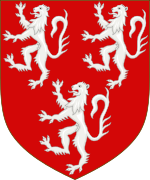Earl of Ross facts for kids
The Earl or Mormaer of Ross was a powerful leader in the area of Ross in northern Scotland. This title was like being a ruler of a large province. The Earls of Ross played a big part in Scottish history for many centuries.
Quick facts for kids Earldom of Ross |
|
|---|---|
| Creation date | 12th century |
| Peerage | Peerage of Scotland |
| First holder | Ferquhard |
| Last holder | Charles |
| Former seat(s) | Balnagown Castle |
Contents
How the Earldom of Ross Began
In the early Middle Ages, the land of Ross was part of a much larger area called the earldom of Moray. It seems Ross became its own separate earldom around the mid-1100s.
Malcolm MacHeth: The First Earl
One of the first people known as Earl of Ross was Malcolm MacHeth. He had been held prisoner for rebelling against King David I. But when Malcolm's brother-in-law, Somerled, attacked Scotland, King David I had to make a deal. He released Malcolm and gave him the earldom of Ross.
Floris III of Holland's Connection
Later, in 1161, William the Lion, another Scottish king, gave the title to Floris III of Holland. This happened when Floris married William's sister, Ada of Huntingdon. However, Floris didn't really rule Ross. He held the title only in name. The title didn't seem to pass to his children.
Ferquhard: A True Founder
The real start of the Earldom of Ross as a strong, ruling title came with Ferquhard. He was known as MacIntagart, which means "son of the priest." In 1215, a new king, Alexander II, faced a rebellion in Moray and Ross. Ferquhard helped the king by capturing the rebel leaders. He brought their heads to Alexander, and for this, he was made a knight. He officially became the Earl of Ross around 1226.
Changes in the Earldom's Rulers
The family line of Ferquhard continued until William, 5th Earl of Ross, died in 1372. William had two daughters.
The Leslie Family Takes Over
His oldest daughter, Euphemia, married Sir Walter Leslie. Sir Walter then became Earl of Ross because of his marriage. The Leslie family held the earldom for a while.
Euphemia II and the Lord of the Isles
Another heiress, also named Euphemia, later inherited the title. She was often ill. Her grandfather, the powerful Robert, Duke of Albany, managed Ross for her. However, Euphemia's uncle, Donald, Lord of the Isles, believed he had a stronger claim to Ross through his wife, Mariota Leslie. He worried that Albany would take Ross and more. So, in 1411, Donald invaded Ross with a large army. He won important battles like the Battle of Dingwall and the Battle of Harlaw.
In 1415, Euphemia gave up the earldom to Albany's son, John.
The Crown Takes Control
However, the Albany family soon lost their power. When King James I returned to Scotland in 1424, he took revenge on the Albany family. They were accused of harming James's brother, David. James had the family's lands and titles taken away. The earldom then officially went to Alexander Macdonald, Lord of the Isles. His son, John, later lost the title in the 1470s.
Later Creations of the Title
The title of Earl of Ross was created again several times for members of the royal family.
James Stewart, Duke of Ross
In 1481, King James III gave the earldom to his second son, also named James. This James was already a Marquis. In 1487, his earldom was made into a dukedom, a higher title. He also received other titles. This James became a church leader and never married or had children. When he died in 1503, all his titles ended.
Henry, Lord Darnley
The title was created a fourth time on May 20, 1565, for Henry, Lord Darnley. He was also made Lord Ardmannoch and later Duke of Albany. After his death, his baby son, James, inherited the titles. When James became King of Scotland a few months later, the titles returned to the Crown.
Charles I of England
On December 2, 1600, Charles Stuart was made Duke of Albany. He also received the Marquisate of Ormonde, the Earldom of Ross, and the Lordship of Ardmannoch. Charles's older brother, Henry, died unexpectedly in 1612. Charles then became Prince of Wales, meaning he was next in line to the throne. When he became king in 1625, the titles again returned to the Crown.
Today, there is no Earl of Ross. Sometimes people wonder if the title might be given to a member of the royal family again in the future.
|
|
|
|
|
| Notes:
Suo jure is Latin for "in her own right". It is used following the title of a noblewoman to specify that she holds the title independently of her husband. |
|
References:
|
List of Earls of Ross
Early Mormaers/Earls of Ross
- Malcolm MacHeth (died 1168)
- With the crown
- Ferquhar (died 1249)
- William I (died 1274)
- William II (died 1323)
- Hugh, Earl of Ross (died 1333) (from whom descend the chiefs of Clan Ross)
- William (died 1372)
- Euphemia I (died c. 1394)
- Married Sir Walter Leslie
- Alexander Leslie (died 1402)
- Euphemia II (died c. 1424) (resigned c. 1415)
- John Stewart, (died 1424)
- Mariota (died c. 1429) (sister of Alexander Leslie, Earl of Ross)
- Alexander of Islay (died 1448)
- John of Islay (died c. 1498) (forfeited 1476)
Earls of Ross, creation of 1481
- James Stewart (1476–1504)
Earls of Ross, creation of 1565
- Henry Stuart (1545–1567) (later Duke of Albany and King of Scotland)
- James Stuart (1566–1625) (became king in 1567)
Earls of Ross, creation of 1600
- Charles Stuart (1600–1649) (became king in 1625)


